 COMPETITIVITY - DIFFICULT TO SAY AND EVEN HARDER TO ACHIEVE COMPETITIVITY - DIFFICULT TO SAY AND EVEN HARDER TO ACHIEVE |
After decades of losing their money to hyperinflation and routine devaluations, Argentines have been enjoying currency stability for more than 10 years now.
But an unusually muscular Argentine peso tied at par with the U.S. dollar also happens to have its downside - companies complain that the high value of the local currency makes exports a nearly impossible task while giving foreign competitors an edge over local producers.
The peso’s value has risen by 33 percent against the currencies of countries such as Germany, Spain or France, protests Jose de Mendiguren, chairman of the Argentine Industrial Union (UIA). Europe is now selling us food and other products that they never could sell us before, while we find it impossible to sell them the goods we’ve always sold them.”
So exactly ten years after the Argentine peso was linked to the dollar, President De la Rua last March pressed Cavallo, the father of Convertibility, back into service and assigned him a difficult job: making the peso more competitive without resorting to a devaluation - a move that could deal a deadly blow to an already ailing economy.
 "Super Cavallo" "Super Cavallo" |
The president also bestowed him with what people in the street quickly dubbed superpowers - ample leeway to take whatever measures he deemed necessary to achieve that goal.
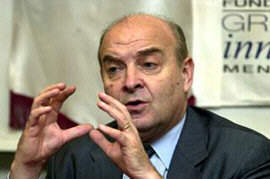
Back at his desk in the Economy Ministry across the street from De la Rua’s Casa Rosada, Cavallo quickly came up with a recipe to pull Argentina from the pit of a crippling, three-year-old-recession (the longest in the country’s history) and prop up exports, which represent a paltry 10 percent of Gross Domestic Product.
The minister’s medicines include budget and tax cuts, rising some import tariffs and subsidizing selective exports, and plans to introduce what he calls an enhanced convertibility”, one that in the future will tie the peso to both the dollar and the euro (as opposed to just the dollar).
The new law, which won quick passage through Congress, will kick in whenever the euro goes at par with the U.S. currency. From that moment on, the peso will quote right in the middle point between the two tenders.
Voila, says Cavallo, pulling one more of his traditional hat trick - no devaluation and a more competitive peso, one that will not follow the dollar every time it perches at the top of the foreign exchange charts.
Since the day when the euro catches up with the dollar to trigger the new exchange mechanism into action is still uncertain, the minister came up with a temporary system of subsidies to exporters and higher import barriers that act as a de facto foreign trade peso. Voila again: cheaper exports, dearer imports, and the peso remains unscathed, convertibility intact. Who could ask for more?
 Ghosts from the Past Ghosts from the Past |
The Mercurial minister pressed the move in an atmosphere of great skepticism, mostly from other economists and politicians who feared that tampering in any way with the value of the peso would make the ghosts of devaluation creep back from the shadows of the past to haunt Argentines again.
But the Peronist Party, a grouping with a belligerent track record every time it found itself out of power, this time around decided to exercise restraint - some say out of maturity, others in recognition to the fact that Cavallo first took the reins of the economy and implemented Convertibility during a Peronist government led by ex-President Carlos Menem (currently under house arrest on racketeering charges).
We have to say that . the executive power and the president have been able to pass all the laws they needed in order to carry forward their process of change, Cabinet Chief Chrystian Colombo admits.
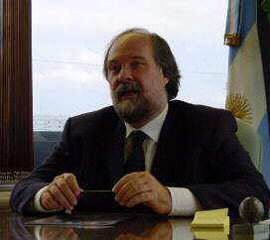
Still, feeling backing from a weakened coalition government - whose political and economic misfortunes have badly eroded its clout—could be insufficient to forge ahead with his plans, Cavallo appealed directly to the population for support.
Argentines will allow no one to pick their money from their pockets, the minister roared in mid July when announcing new belt-tightening measures. They will demand that convertibility be maintained at any and all cost.”
He knew his audience well - for generations, Argentines who wanted to buy a house or a car had only one way to do it: by paying cash. Among many other things, hyperinflation and routine devaluations had all but killed credit.
 Renewed Confidence in the Peso Renewed Confidence in the Peso |
In 1991 Convertibility put an abrupt halt to the daily erosion of the peso’s value, quickly restoring people’s confidence in money. Soon millions of Argentines were purchasing all they could on credit and holding the minister as some sort of national hero.
All fine and well, except for one detail - loans, with very few exceptions, were and still are denominated in dollars, not pesos. The same is true of all rent and mortgage contracts, as well as of roughly two thirds of bank loans to companies. So any devaluation would have an immediate, direct effect on people’s welfare.
In order to allay those fears, Cavallo now promised to slash $1.5 billion in public spending. Here again he is counting on a little help from his former friends, Peronist provincial governors who control all the country’s major provinces and without whose cooperation the federal government cannot carry forward such major cuts.
The move is a step in the right direction, provided it is accompanied by a streamlining of the tax system, cautions Enrique Olivera, chairman of the state-run Banco Nacion, the country’s largest bank. Cutting down public spending is always convenient, there always are excesses and overspending, he argues. This move must be accompanied by a tax reform that stimulates investment.”
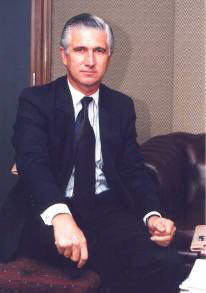
Overall, the business community gives Cavallo high marks. He is the best known economist of the emerging markets. World leaders from Europe, the United States and the Far East recognize his truly outstanding character and ability, says Alejandro Reynal, Chairman of the MBA investment bank.
In a bid to inject stamina to key industries, the government picked individual sectors such as metalworking, capital goods, beef production, apparel, textiles, carmaking and footwear as the initial beneficiaries of the tax reduction drive.
|  A Taxman’s Nightmare A Taxman’s Nightmare |
While the move received ample support, industrialists complain that it had an undesired side effect, a complex taxation system with so many ad-hoc arrangements that it made collection and monitoring a nearly impossible task in a country where tax dodging is already rampant.
Action was also taken on the foreign trade front, while import tariffs of several consumer goods increased to up to 35 percent, those on capital goods were brought down to zero.
This is a very good signal for us, celebrates Jaime Campos, Executive Director of the Invertir Foundation, a group set up by Argentine companies in order to attract foreign direct investment flows into the country. It means that we are going to work in order to gain more and more competitivity.”
The move was met with mixed feelings in neighboring Brazil, Latin America’s largest economy and a key partner of Argentina in the Mercosur customs union, which also includes Paraguay and Uruguay as full-fledged partners and Chile and Bolivia as associate members.
Mercosur member states are excluded from the consumer goods tariffs increase, giving Argentina’s partners an edge over other nations in the world. But the elimination of import tariffs on capital goods puts Brazil’s sales to Argentina at par with everyone else’s.
Brazil was really alarmed by Cavallo’s announcement, complains Eloi Rodrigues de Almeida, chairman of the Brazil Group, a loose association of 190 Brazilian companies conducting business in Argentina. We are going to be at the same level as Europe and the United States. I don’t think that’s right.”
 Back to Pre-Industrial Times Back to Pre-Industrial Times |
But the move was taken with Argentine, not Brazilian producers in mind. It was implemented to address complaints such as the one posed by UIA’s De Mendiguren, who protests that an overvalued peso threw Argentina back into a time when the country was basically a commodities exporter -mainly of grains and beef—and had to buy all industrial goods abroad.
Argentina sells cotton to Brazil and imports yarn and fabrics, it exports hides to Brazil and buys the shoes. Its exports are worth an average $300 a ton and its imports an average $1,500 a ton. So deep is the crisis that Argentina, a major potato producer, is now importing 90% of the potato flakes it consumes, De Mendiguren laments.
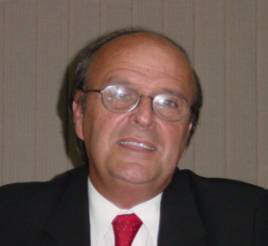
This state of affairs was not what Cavallo had in mind when, in his first term as minister, he implemented arguably the most revolutionary changes in Argentina’s economic history.
Back then he threw decades of Soviet-style, state-centered economics out of the window and substituted them with free market policies, selling off dozens of decaying, money-losing public companies to private investors and opening up the country’s floodgates to foreign capital.
The result was a downpour of billions of dollars of foreign direct investment and the quick transformation of Argentina into a modern country with a strong technological sector and which for several years grew at 6-7% rates.
 Crisis Management Steps Crisis Management Steps |
But in the late 1990’s the nation plunged again into political bickering, Menem fired Cavallo, and political corruption, electioneering and overspending reigned supreme.
De la Rua’s Alianza coalition took power in late 1999 after two terms by Menem and took a series of steps in a bid to bring some order into the economic chaos.
The most recent moves included the so-called iron plating”, a $40 billion rescue package arranged in December, and a $30 billion debt megaswap implemented by Cavallo in June.
The IMF-led rescue package was part of an international effort to try and bail Argentina out of what looked like a likely default on its $130 billion foreign debt, which represents nearly half the country’s GDP and whose service siphons $11 billion from state coffers every year.
Under the megaswap, sovereign bonds coming due between now and 2005 were exchanged for similar instruments maturing between 2006 and 2031, alleviating short-term pressures and giving the government more time to put the economy back on a path of growth.
But however impressive, those moves were not enough to allay capital market jitters over the health of a shrinking economy mired by huge debts and a snowballing fiscal deficit (expected to reach $6.5 billion this year)- the country risk continued to rise, driving up borrowing costs, which in turn increase the debt burden and slows the economy.
That’s when Doctor Cavallo came up with his bitter medicine of across-the-board budget cuts and other cost-control measures, which met the initial blessing of most economists and politicians.
 Optimism About the Future Optimism About the Future |
But the real acid test for the proposals, which include plans to cut state salaries and pensions, will be how much support he manages to garner from people in the street, who have traditionally backed his moves.
Peddling more belt-tightening to Argentines who were already complaining that they’ve already been fed an overdose of austerity will be a hard sale. Cavallo is used to pulling rabbits out of the hat whenever necessary. But this time around, all agree, it’ll have to be a political rather than an economic hat trick.
However big the challenge, economists, politicians and businessmen concur that Argentina has all the ingredients to come out of the crisis and get back on its feet again.
A United Nations Human Development Program report released in July put Argentina at the top of Latin America and number 30 in the world in terms of social development. The ranking takes into account life expectancy, education and health levels, GDP per capita, access to drinking water and other basic services, and technological development.
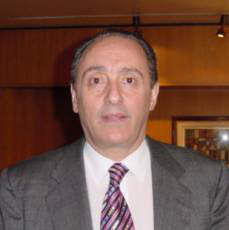
Add a robust banking system and solid democratic institutions -both of which were able to withstand all kinds of political and financial pressures (including the quitting last year of Argentine Vice President Carlos Alvarez), and the result is concern about the short-term situation but steadfast optimism about the future.
When Argentina overcomes this difficult moment it will become an excellent spot for doing business in the region, says Hector Magnetto, President of the Clarin multimedia group. ”Besides, there is still a lot of room for development in the Argentine territory. Argentina is a very large country and has a good market with qualified people.” |

